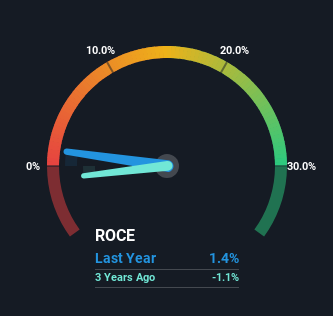- Germany
- /
- Electric Utilities
- /
- DB:LEC
These Return Metrics Don't Make Lechwerke (FRA:LEC) Look Too Strong
If you're looking at a mature business that's past the growth phase, what are some of the underlying trends that pop up? A business that's potentially in decline often shows two trends, a return on capital employed (ROCE) that's declining, and a base of capital employed that's also declining. Ultimately this means that the company is earning less per dollar invested and on top of that, it's shrinking its base of capital employed. And from a first read, things don't look too good at Lechwerke (FRA:LEC), so let's see why.
What Is Return On Capital Employed (ROCE)?
Just to clarify if you're unsure, ROCE is a metric for evaluating how much pre-tax income (in percentage terms) a company earns on the capital invested in its business. To calculate this metric for Lechwerke, this is the formula:
Return on Capital Employed = Earnings Before Interest and Tax (EBIT) ÷ (Total Assets - Current Liabilities)
0.014 = €9.3m ÷ (€1.8b - €1.1b) (Based on the trailing twelve months to June 2024).
So, Lechwerke has an ROCE of 1.4%. Ultimately, that's a low return and it under-performs the Electric Utilities industry average of 7.8%.
Check out our latest analysis for Lechwerke

Historical performance is a great place to start when researching a stock so above you can see the gauge for Lechwerke's ROCE against it's prior returns. If you're interested in investigating Lechwerke's past further, check out this free graph covering Lechwerke's past earnings, revenue and cash flow.
The Trend Of ROCE
The trend of ROCE at Lechwerke is showing some signs of weakness. Unfortunately, returns have declined substantially over the last five years to the 1.4% we see today. In addition to that, Lechwerke is now employing 60% less capital than it was five years ago. The fact that both are shrinking is an indication that the business is going through some tough times. If these underlying trends continue, we wouldn't be too optimistic going forward.
While on the subject, we noticed that the ratio of current liabilities to total assets has risen to 61%, which has impacted the ROCE. If current liabilities hadn't increased as much as they did, the ROCE could actually be even lower. And with current liabilities at these levels, suppliers or short-term creditors are effectively funding a large part of the business, which can introduce some risks.
What We Can Learn From Lechwerke's ROCE
To see Lechwerke reducing the capital employed in the business in tandem with diminishing returns, is concerning. Investors haven't taken kindly to these developments, since the stock has declined 13% from where it was five years ago. That being the case, unless the underlying trends revert to a more positive trajectory, we'd consider looking elsewhere.
Lechwerke does come with some risks though, we found 2 warning signs in our investment analysis, and 1 of those makes us a bit uncomfortable...
If you want to search for solid companies with great earnings, check out this free list of companies with good balance sheets and impressive returns on equity.
New: AI Stock Screener & Alerts
Our new AI Stock Screener scans the market every day to uncover opportunities.
• Dividend Powerhouses (3%+ Yield)
• Undervalued Small Caps with Insider Buying
• High growth Tech and AI Companies
Or build your own from over 50 metrics.
Have feedback on this article? Concerned about the content? Get in touch with us directly. Alternatively, email editorial-team (at) simplywallst.com.
This article by Simply Wall St is general in nature. We provide commentary based on historical data and analyst forecasts only using an unbiased methodology and our articles are not intended to be financial advice. It does not constitute a recommendation to buy or sell any stock, and does not take account of your objectives, or your financial situation. We aim to bring you long-term focused analysis driven by fundamental data. Note that our analysis may not factor in the latest price-sensitive company announcements or qualitative material. Simply Wall St has no position in any stocks mentioned.
About DB:LEC
Established dividend payer with adequate balance sheet.
Market Insights
Community Narratives



